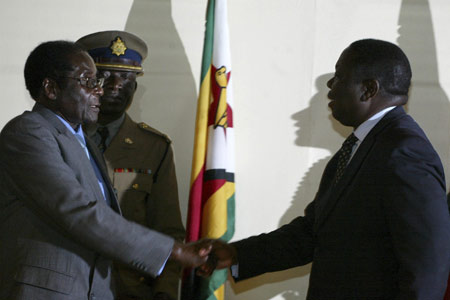Zimbabwe's ruling ZANU-PF party and the opposition Movement for Democratic Changes (MDC) formally started talks Thursday in South Africa's administrative capital Pretoria to seek an end to Zimbabwe's political deadlock.
The talks were under way on Thursday, President Thabo Mbeki's spokesman Mukoni Ratshitanga said, according to reports by agencies.

Zimbabwe's President Robert Mugabe (L) shakes hands with Morgan Tsvangirai (R), leader of Zimbabwe's main opposition Movement for Democratic Change (MDC), in Harare July 21, 2008. Mugabe and Tsvangirai on Monday signed a deal laying down the framework for formal talks on forming a power sharing government to end a deep political crisis. (Xinhua/Reuters Photo)
Leading negotiators at the talks in an undisclosed venue are Zimbabwe's Justice Minister Patrick Chinamasa and Public Services Minister Nicholas Goche, representing ZANU-PF, and MDC's Secretary General Tendai Biti and Deputy Treasurer Elton Mangoma.
The four negotiators flew to South Africa Wednesday on the same flight, reported Zimbabwe's state-run newspaper The Herald.
Preliminary talks began on Tuesday after ZANU-PF and the two factions of MDC signed in Harare Monday a Memorandum of Understanding (MoU), under which they agreed to commit themselves to a dialogue.
The deal envisaged that "the dialogue will be completed within a period of two weeks from the date of signing of this MoU."
South African President Thabo Mbeki, who was entrusted by the 14-member Southern African Development Community last March to mediate between Zimbabwe's rival parties, oversaw the signing of the MoU.
The ZANU-PF convened an extraordinary politburo meeting Wednesday, giving the party's negotiating team the green light to continue with the dialogue in line with the negotiating parameters as spelt out in the MoU, The Herald said.
The agenda for the next two weeks includes the objectives and priorities of a new government, a new constitution, restoration of economic stability and growth, sanctions and the land question, South Africa's Business Day newspaper reported Thursday.
It quoted sources close to the talks as saying that most of the issues on the agenda had already been agreed.
A quick deal is expected because the final agreement would be based on a document approved, but not signed, by the parties in January, according the report.
The rival parties reached an agreement in January after eight months of talks, but failed to sign it due to clashes over the date of elections and the mechanics of implementing the agreement.
President Robert Mugabe, leader of the ZANU-PF, was declared on June 29 winner of the presidential run-off held on June 27 and was immediately sworn in for a new five-year term.
However, Morgan Tsvangirai, leader of the bigger faction of the MDC, who received a leading number of votes in the first round of presidential election on March 29 but fell just short of an overall majority, boycotted the run-off and refused to acknowledge Mugabe's victory.
The two factions of the MDC won a majority of seats in parliament in the legislative elections held simultaneously with the presidential polls, the first time that the ZANU-PF lost its majority in the parliament since the country's independence in 1980.
Mugabe has not appointed a new cabinet or sworn in a new parliament.
(Xinhua News Agency July 25, 2008)